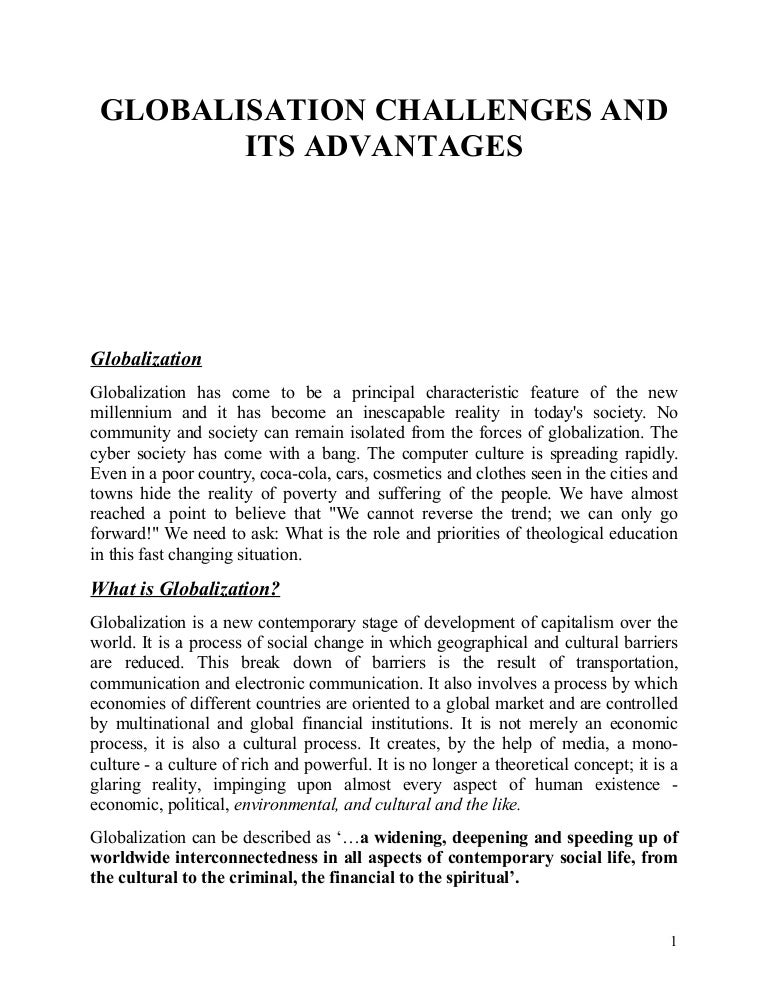Economic Drivers Which Might Impact Globalization
Playing by the rules is hard to do when competitors misclassify workers Prepared by EPI In February 2015, after hearing testimony from truck drivers and stagehands, the Georgia Senate Insurance and Labor Committee voted unanimously to study misclassified workers in the state and to find ways to enhance job protections for workers in this category. Along with the hardships faced by misclassified workers, much of the discussion in a public hearing by committee members focused on how companies that wrongly misclassify employees as ICs gain an unfair advantage over their competitors by escaping payroll taxes. The Georgia Senate’s President Pro Tempore, David Shafer, told the committee, “I’m persuaded this failure to enforce existing laws is unfair. It’s unfair to workers who are working very hard to support themselves and their families, and it’s unfair to businesses who obey the law and are then put at a disadvantage.” (Jones 2015a) It has been estimated that more than a third of construction workers in Southern states such as North Carolina and Texas have been wrongly classified as independent contractors. Annual losses amount to about $400 million in Florida, $467 million in North Carolina, and $1. Super Taxi Driver 320x240 Jar. 2 billion in Texas (Ordonez and Locke 2014b).

When and where misclassification spreads It appears that IC misclassification spreads under one or both of the following conditions: (1) where it is most profitable to commit fraud (i.e., where avoiding mandated costs results in significant savings, such as in construction, where workers’ compensation insurance premiums are high, and in other sectors where injuries are common), and (2) where the business organization is such that the practice is easy to conceal and employer responsibility hard to pin down. The latter is the case in long subcontracting chains (another characteristic of construction), where the work is project-based, where companies rise and fall, and where there is a high rate of turnover of employers (or “bosses”). IC misclassification also occurs in work settings where monitoring is more difficult because worksites are small, are scattered, and employ few workers. It occurs where workers operate in isolation, such as with housecleaning and in-home care, where the worker is dispatched by an agency but is treated by the agency as a self-employed worker. Misclassification also occurs in settings where the work is performed individually but within the context of a large business organization, which entails layers of subcontracting. Trucking deregulation and restructuring over the past 20 years have resulted in heavy use of independent contractors for driving, many of whom are misclassified employees (see the section “Recent patterns and trends to watch”). In fact, several courts have determined that arrangements in which drivers lease trucks and are subject to a number of behavioral requirements and mandated costs under the lease agreement constitute employment and that employees were misclassified as ICs.
Several components of the social protection system also are adversely affected by IC misclassification, most directly the unemployment insurance and the workers’ compensation insurance systems. The federal unemployment insurance system and state systems established to finance UI benefits are impacted by misclassification fraud through the loss of UI tax revenue. If a worker files for UI benefits, challenges his or her IC status, and is found to have been improperly classified by the employer as self-employed, the worker is eligible for benefits— while no tax was collected from the employer. Fines and retroactive taxes have to be collected from the employer (except in cases where the employer can receive exemption through establishing good-faith ignorance). Westminster Doorbell Wav File.
State worker compensation and disability insurance systems are adversely affected in similar ways. Misclassified ICs who are injured on the job and are found to be misclassified may, in many states, receive benefits from a public “uninsured employer fund” set up to compensate employees of businesses who fail to purchase insurance.
Workers’ compensation insurance benefits are also paid to injured workers whose employer has retroactively enrolled them in the company’s insurance policy, according to insurance industry fraud units. This practice entails enrolling a worker as of the Monday of the week of injury. Waiting until an employee is injured before paying insurance premiums makes the system more expensive for employers that comply with the law. Federal and state income tax systems face significant revenue losses in income tax revenues and therefore have a stake in the eradication of IC misclassification. A 1984 IRS study found that 15 percent of employers engaged in misclassification and misclassified 3.4 million workers as independent contractors, resulting in an estimated loss of $1.6 billion in FICA tax, unemployment tax, and income tax combined (or $3.5 billion, as of 2014, adjusted for inflation) (Bickley 2011, 10). According to the IRS, independent contractors, and the self-employed more generally, tend to underreport income.
Comments are closed.